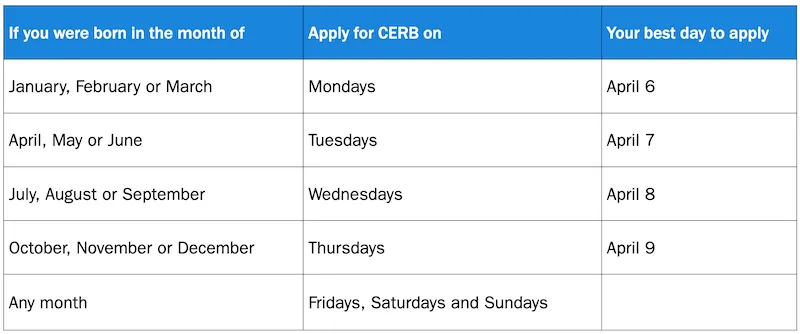Wondering how Canadian small businesses can get some relief during this uncertain time? Here’s a roundup of what’s available to help you navigate COVID-19.

Canadian small businesses are struggling in the face of a global COVID-19 pandemic that is threatening our economy along with our health.
Due to COVID-19, 77% of small- and medium-sized businesses are partially or entirely closed, according to a Canadian Federation of Independent Business survey. Furthermore, upwards of 57% of the businesses that remain open say sales have decreased significantly. While of the businesses that have closed, 32% are unsure if they will reopen.
Certainly the statistics are not cheering. But there are federal supports that can serve as lifelines for small business owners across the country. The trick, though, is to untangle what’s available and for whom. Information from governments is notoriously challenging to decipher.
That’s why we’re breaking down all the relief programs for which you may be eligible. From Employment Insurance (EI) special benefits for the self-employed to the temporary wage subsidy for small business owners with employees, these services can help you gain a foothold in this uncertain time.
Canada Emergency Response Benefit (CERB)
The CERB offers a monthly $2,000 payment for up to 16 weeks for people who wouldn’t otherwise be eligible for EI. This includes contract workers and self-employed small business owners. It is backdated to March 15, 2020.
Are You Eligible?
To take advantage of this benefit, you must:
- Have earned a minimum of $5,000 in 2019 (or in the year before your application) through employment, self-employment, or employment insurance maternity and parental benefits (or similar benefits in Quebec)
- Have been without income for at least 14 consecutive days in a four-week period because of COVID-19 (i.e., are sick or in quarantine, or need to care for a child or family member)
Note
If you’re an employer, it’s important to know that your employees may be eligible for the CERB if your business is experiencing disruptions that affect the work they typically do.
When Is the CERB Available?
The CERB portal is scheduled to open April 6 through the Government of Canada website.
You may apply online or by phone. A schedule has been developed to help provide the best service possible:
If you’re enrolled in direct deposit, you can expect your first CERB payment within three business days of applying. If you’re getting a payment by check, you can look for the check to arrive within 10 days. Payments will be made every four weeks and will be available from March 15 to October 3, 2020.
How Quickly Will Funds Come Through?
It’s important to know that you’ll need to apply and confirm your eligibility for CERB every four weeks (to a maximum of 16 weeks) if your situation continues.
Temporary Wage Subsidy for Employers
Not sure how you’re going to keep your employees on the payroll if your business is in decline? The Temporary Wage Subsidy will cover up to 75% of their wages.
Are You Eligible?
Businesses of all sizes, in all sectors (including individuals, partnerships and corporations) are eligible for this subsidy if they have suffered at least a 15% decline in revenue because of the COVID-19 pandemic. That’s up to the first $58,700 worth of salary.
The maximum amount of subsidy would be $847 per week (per employee), unless you top up any exceeding salary from the $58,800 limit from your business’ own funds. Like the CERB, the program is backdating to March 15. It will be available for three months.
How Does It Work?
According to the Financial Post, the subsidy will be calculated manually. Small business owners can choose to reduce payroll income tax remittances to the Canada Revenue Agency (CRA) by the amount of the subsidy. “The reduction of tax remittances can begin on the employer’s next remittance date (April 15) if the employer is a quarterly or monthly filer. The amount of the wage subsidy will be included in the employer’s income and taxed in the year it is received,” writes columnist Jamie Golombek.
When Is the Subsidy Available?
More information is expected to come in early to mid-April.
Canada Emergency Business Account
In collaboration with Export Development Canada and implemented by financial institutions across the country, the Government of Canada is providing interest-free loans of up to $40,000 to small businesses and non-profits. Due to the effects of COVD-19, this is to help recoup the operating costs when revenues are abysmally low.
Are You Eligible?
To qualify, you will need to prove that you paid between $50,000 and $1 million in total payroll in 2019.
When Will I Need to Repay the Loan?
You will need to pay back the balance of the loan by Dec. 31, 2022 to receive the loan forgiveness of 25% (up to $10,000).
Deferred Tax Payments
Deferring tax payments is another measure that may help small business owners maintain cash flow.
Tax Balances Due and Tax Instalments
The CRA has deferred 2019 income tax payments to September 1, 2020. This applies to tax balances due and income tax instalments. There will be neither penalties nor interest for deferring your payments to September.
GST/HST Remittances
Under normal circumstances, GST/HST remittances are due by the end of the month following their reporting period. Under the new relief measures, the CRA will extend the remittance deadline until June 30, 2020.
This means that businesses filing monthly can delay remitting amounts collected for February, March and April 2020 reporting periods until the end of June.
Businesses that file quarterly have until June 30, 2020 to remit amounts collected for the January 1 to March 31, 2020 reporting period.
If you file annually, and your GST/HST return or instalments are due in March, April or May 2020, you can remit amounts collected and owing for the previous fiscal year by June 30, 2020.
Free Online Service for Small Business Owners
It can be tough to navigate the financial supports available during the COVID-19 crisis. And things seem to be changing all the time. The Financial Advisors Association of Canada (a.k.a. Advocis) is offering a free online service that connects financial advisors with small business owners who could use some help sifting through the possibilities.
To get help, fill out the form on Advocis Connect and you’ll be connected to a financial advisor who can answer questions related to government relief programs that may be available for your business.
These are uncertain times to be sure. It’s important for small business owners to know that financial relief and support are available. Even small measures can help mitigate the losses we’re all experiencing.
about the author
Heather Hudson has been a freelance writer for more than 17 years. As a small business owner, she understands the triumphs and challenges of life as an entrepreneur. And as a long-time FreshBooks customer, she’s always looking for ways to work smarter, not harder. You can learn more about her work at heatherhudson.ca.


 COVID-19 Resources for Freelancers and Small Business Owners
COVID-19 Resources for Freelancers and Small Business Owners How Small Business Owners Can Prepare for a Recession
How Small Business Owners Can Prepare for a Recession Managing Your Business During Uncertain Times
Managing Your Business During Uncertain Times






